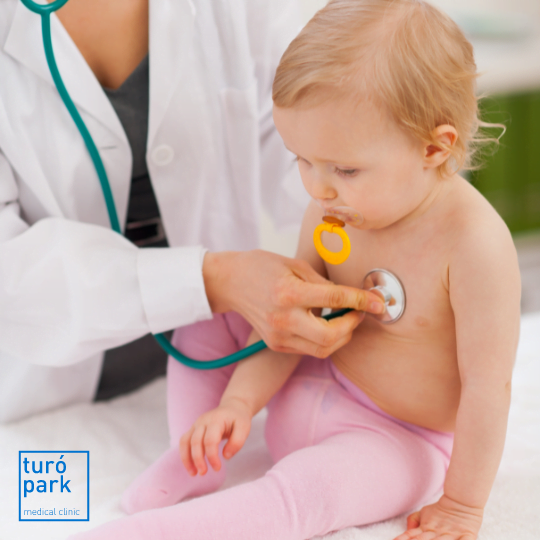Are you looking for a specialist in paediatric cardiology in Barcelona?
The paediatric cardiologists at Turó Park Medical Clinic diagnose and treat congenital heart defects as well as cardiomyopathies, pulmonary hypertension, all heart rhythm abnormalities and cardiac complications of chronic diseases in children, providing the most appropriate overall care for the child and his or her parents.
If your child requires cardiological follow-up, do not hesitate to make an appointment now with one of our specialist paediatricians.
Fast track your treatment
To book an appointment or speak with one of our friendly team, please get in touch using the options below.

What is paediatric cardiology?
Paediatric cardiology is a medical specialty dedicated to the treatment, monitoring and prevention of many heart and related diseases affecting infants, children and adolescents.
Paediatric cardiologists are specially trained to look for heart problems in young people.
What are the most common heart conditions in children?
Heart diseases in children are most often congenital heart defects, but also cardiomyopathies, pulmonary arterial hypertension, all heart rhythm abnormalities as well as cardiac complications of chronic diseases in children.
A distinction is generally made between congenital heart defects and acquired heart disease.
- Heart valve disease (narrowing of the aortic valve)
- Hypoplastic left heart syndrome
- Atrial septal defects
- Ventricular septal defects
- Persistent ductus arteriosus
- Tetralogy of Fallot
- Arrhythmia: tachycardia (fast heartbeat), bradycardia (slow heartbeat), long Q-T syndrome.
- Atherosclerosis
- Kawasaki disease
- Rheumatic heart disease
- Pericarditis
- Heart murmur
- Viral infections
What are the symptoms of heart disease in children?
Some heart conditions have a variety of signs and symptoms, while others have no symptoms at all.
However, we recommend that you consult a paediatric cardiologist if your child has one or more of the following symptoms
- Dizziness
- Shortness of breath
- High blood pressure
- Changes in heart rhythm
- Chest pain
- Fainting
- Exercise problems or inability to exercise
- Poor nutrition
- Rapid breathing
- Lung infection
- Low or abnormal weight gain
If there is a suspicion of heart disease, the paediatrician may suggest various tests such as an electrocardiogram (ECG), 24-hour heart rate recording, echocardiography, stress test, magnetic resonance imaging (MRI) or cardiac catheterisation.
We take care of your children.
Our English-speaking pediatricians adapt sensitively to the cultural preferences of parents and children in order to offer them personalised and humane care.

What are the treatments for heart disease in children?
In the case of heart disease, several treatment options are available depending on the type of disease and the age of the child.
The doctor may also advise supervised waiting, i.e. waiting before treating the condition to see how it develops. Some disorders disappear on their own without treatment. Others may require immediate treatment.
Some congenital and acquired heart defects are minor and can therefore be treated and corrected with medication. These drugs enable the heart to function and work more efficiently. The most commonly used are angiotensin converting enzyme (ACE) inhibitors, angiotensin II receptor blockers (ARBs) and beta-blockers.
Surgical treatment aims to correct the blood flow, or the relevant problem related to congenital heart disease, to help the child live and grow. Some surgeries are called palliative surgery or palliation, which means the alleviation of a disorder when its cause cannot be fully eliminated or corrected.
Our English-speaking pediatric cardiologist
